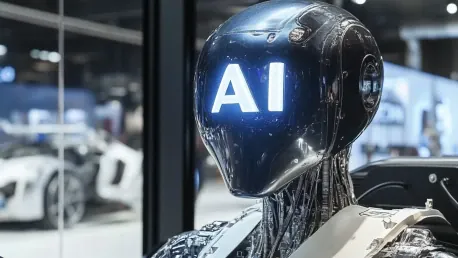In a bold move aimed at reshaping the United States’ artificial intelligence landscape, former President Donald Trump launched a $500 billion AI initiative known as Project Stargate. The project, which seeks to establish America as the frontrunner in AI technology, involves significant cooperation with tech giants such as OpenAI, Oracle, and SoftBank. It promises to revolutionize the sector by constructing up to 20 large AI data centers across the country, with the first already underway in Abilene, Texas.
Monumental Funding and Deregulation
A $500 Billion Investment
Project Stargate is funded by an unprecedented $500 billion, highlighting the monumental scale of Trump’s vision for U.S. AI dominance. This massive financial commitment is intended to ensure that the United States can compete with and potentially surpass other global AI leaders, most notably China. The funds are allocated to the development of state-of-the-art data centers, which are crucial for processing the vast amounts of data required for advanced AI algorithms. However, this ambitious figure has been met with skepticism, particularly from Tesla CEO Elon Musk.
Musk has publicly disputed the $500 billion claim, arguing that the amount of funds secured by SoftBank falls far short of this figure. This has ignited a rivalry between Musk and Sam Altman, CEO of OpenAI, who has defended the project’s scope and its national importance. The skepticism surrounding the funding highlights the competitive and divisive nature of the AI industry, where major players are jockeying for position in a rapidly evolving market. Despite these controversies, the scale of investment underscores the high stakes involved in securing U.S. AI leadership.
Expedited Development and Regulatory Concerns
To accelerate the development of AI infrastructure, Trump issued an executive order that significantly reduces regulatory hurdles. This order expedites the approval process for constructing data centers, allowing for quicker implementation of Project Stargate’s objectives. In some cases, Trump has even employed emergency powers to bypass traditional regulatory timelines. This fast-tracked approach indicates a clear shift away from the previous administration’s focus on AI safety and regulatory oversight, opting instead for rapid development and deployment.
However, this deregulation has sparked substantial controversy. Critics argue that the removal of regulatory safeguards could lead to unforeseen consequences, as the balance between innovation and safety is disrupted. The decision to permit data centers to use various types of fuel, including coal, has further fueled environmental concerns among climate activists. The trade-off between speed and regulation poses a significant ethical dilemma, as it prioritizes immediate technological advancement over long-term sustainability and safety.
Corporate Dynamics and DEI Programs
The Role of Corporate Participation
The success of Project Stargate hinges on the active participation of leading technology companies such as OpenAI, Oracle, and SoftBank. These corporations bring not only financial resources but also critical technical expertise and innovation to the table. Their involvement is pivotal in ensuring that the ambitious goals of Project Stargate are met. However, aligning corporate strategies with the project’s rapid pace and regulatory leniency presents challenges, particularly given their existing commitments to diversity, equity, and inclusion (DEI) programs.
While the participating companies uphold DEI initiatives, Trump’s executive order to end such programs in federal agencies introduces potential conflicts within these corporations. Balancing internal DEI commitments with the administration’s contrasting stance creates a complex dynamic that these tech giants must navigate. This tension could impact corporate culture, employee satisfaction, and public perception, ultimately influencing their effectiveness in advancing Project Stargate.
Navigating the Technological Paradigm Shift
The implementation of Project Stargate signifies a paradigm shift in the U.S. technological development strategy. Unlike previous approaches that aimed to balance innovation with regulation, Trump’s strategy favors a more laissez-faire attitude to expedite AI advancements. This shift requires tech companies to adapt quickly, reconciling their ingrained corporate practices with the accelerated development goals mandated by Project Stargate.
Tech giants must strike a delicate balance between meeting the project’s urgent timelines and addressing the social and environmental concerns associated with rapid AI deployment. The pressure to align with competing policy directives further complicates this balancing act. As these corporations navigate this new terrain, their ability to innovate while maintaining ethical standards could define America’s technological trajectory and influence the global AI landscape for years to come.
High-Stakes Gamble and Future Implications
Risk and Opportunity in Project Stargate
Project Stargate represents a high-stakes gamble aimed at catapulting the United States to the forefront of AI technology. By dismantling regulatory frameworks in favor of swift construction and operational freedom, the initiative opens up significant opportunities for rapid AI advancements. However, it also introduces considerable risks, particularly regarding oversight lapses and ethical implications. The project’s success or failure will have profound implications for America’s technological leadership and could shape the future of global AI development.
Critics argue that the rush to dominate AI could lead to oversight lapses reminiscent of historical technological revolutions where rapid advancement brought unforeseen consequences. The lack of stringent oversight raises concerns about the potential for unintended outcomes, including ethical dilemmas, security vulnerabilities, and environmental impacts. Balancing the drive for swift progress with the need for responsible innovation remains a central challenge for Project Stargate’s stakeholders.
Long-Term Viability and Ethical Debate
In a groundbreaking effort to transform the United States’ artificial intelligence sector, former President Donald Trump launched a $500 billion initiative called Project Stargate. This ambitious project aims to position America at the forefront of AI technology. To achieve this, it will involve extensive collaboration with major tech companies including OpenAI, Oracle, and SoftBank. One of the project’s cornerstone strategies is the establishment of up to 20 extensive AI data centers nationwide. The first of these state-of-the-art facilities is already under construction in Abilene, Texas. By leveraging cutting-edge infrastructure and strong partnerships, Project Stargate promises to revolutionize the AI field, ensuring that the United States remains a global leader in this critical technology. The initiative is not just an investment in technology but also a significant step to secure economic and strategic advantages in the highly competitive world of artificial intelligence.









